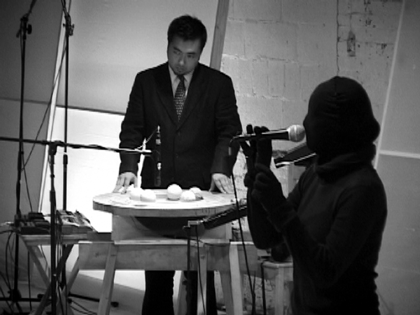The verbose epistemology of experimental dance in Greenpoint
This is where I came in, back in the ‘70s, climbing stairs to watch folks in lofts experiment with movement. On offer this time—an evening hosted by “poetician” Robert Kocik and choreographer Daria Fain, bearing the wide-loaded title, “INTIMATION (Or Cellular self-determination by means of the Prosodic Body).” This public event was the culmination of four work sessions devoted to topics such as “words that materialize and dematerialize the world,” “biochemical and physiological pathways of words,” “internal alchemy,” and “totipotent words, athanatology, somatic immortality through words, types of timelessness.”
A presentation—could there be any doubt? —of Movement Research, and part of its multi-site festival, Open Source 2005.
I hopped the L to Lorimer, then the G to Greenpoint, and walked a few blocks towards 107 Green Street. A fat cat, assuming the White Rabbit role, led me into The Bureau of Material Behaviors, a cheerful living loft whose acronym perhaps yields a playful clue. A red-and-gold kimono hung on one wall, and a banner—”NO TIME TO ADAPT”––floated above. Books—from “Investing for Dummies” to Marx’s “Capital” were crammed into artfully designed bookcases.
Fain and fellow dance artist DD Dorvillier sat on the floor, chatting, while their audience claimed chairs and cushions around a scraggly, quickly shrinking oval of space. Pretty soon, we could sense far more than an intimation of intimacy in this “INTIMATION,” and that would eventually work wonders for lovers of movement. The evening sprawled into three hours with poetry readings by Peter Lamborn Wilson, Lee Ann Brown, and Jonathan Skinner, a duet by Fain and Dorvillier, and an encounter between Kocik and Fain in which they encroached, slightly, on each other’s artistic territory.
The readings and banter stretched on where small, illustrative samples of work would have sufficed. Though lengthy, the first part of the evening worked well enough with Wilson erecting exotic, allusion-laden towers of Babel, and Brown with her vibrant South Carolinian voice making snappy, musical wordplay. These segments offered good evidence that words might indeed be cells and organs of the perceptive, expressive body––fragrant, resonant, and potent. Wilson, the mystic anarchist, sought out all things “nonverbal, paraverbal, and metaverbal” as well as “imagination as chaotic attractor”—a phrase from his “Failure Manifesto”—while Brown declared writing to be a way of pleasure akin to making love.
Despite a break for refreshments, the audience seemed spent, and Kocik’s soft, meandering voice and style, and his obscurantist language, did nothing to revive us. Crouched amid a circle of sheets of paper, he read his poetry while Fain, swathed in a big, zebra-print sweater, rested mere inches away and toyed with various props. I tuned out Kocik and followed the Sphinx-like, Kabuki Earth Mother as she did simple things like cradling and rolling two heavy balls in her right palm or scraping a wooden beam along the floor. The collaborators were both very close to the audience’s inner ring; each gentle repositioning of their bodies felt as if it originated among us, their watchers. For Kocik’s one physical exploit, he grasped five paperbacks in his left hand and extended that arm far to the side as he continued to read—at once postmodernly pedestrian and shamelessly eye-catching.
In a solo, Fain’s mouth struggled with speech while her well-grounded body and articulate, emotive fingers did all the talking. Later, she roused a sleepy-looking Dorvillier with hums, gasps, and explosive vocalizations. Like a shaman, Fain dragged her partner through the darkness beneath the loft’s cocktail table and out into the space. There they took on very different roles—Fain, the tolerant but strong, reliable adult; Dorvillier, the rambunctious child spinning extraordinary verbal and visual fancies out of ordinary things and nothing at all.
One of them—accidentally, I thought, though perhaps it was planned—caught hold of the pull chain dangling from an overhead light and created a wonderful atmospheric change. Merce Cunningham, lover of the unpredictable, would surely smile.
gaycitynews.com


































